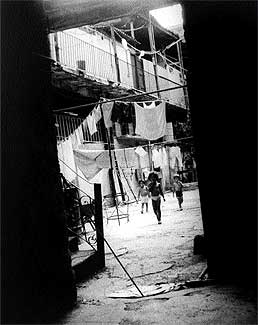The Play of My Mind
“I will bring him home and he shall have his city and shall walk in his ancestral house.”
(Seven Against Thebes. 113)
I am rehearsing Seven Against Thebes; I read an article on TDR that addresses the violent way in which Anton Arrufat’s version of the Seven was censored; I see a movie, The Lives of Others, which speaks of the way the stasi harassed actors, directors and playwrights before the fall of the Berlin wall; I meet a lady on the subway, whose husband, an actor, a playwright, a writer was imprisoned and then exiled from his native Santiago into Canada, and it is not all just a coincidence. Nothing is.
In spite of what Aeschylus said about the Theban war and Polynices, my heart is with him. I may write his defense against Aeschylus’ one sided story. I may invoke his spirit and talk to modern audiences of what exile was like then. I may talk to modern audiences of what exile is like today. Theatre is subversive. It is both written and spoken. It is visceral and real. It could also be censored because it is feared by power structures. I fear it too. Theatre invades my space, my peace of mind, my mind and body.
I wake up with Polynices’ words bouncing inside my head. My personal history mixes with his. I write.
Polynises:
Gods of the Olympus, I brake my silence and kneel to your greatness which I question. Hades has worn out my pride and now I bow to you to reveal the truth. I come to denounce the wrong doings of History.

Performance Piece: Wet Foot/Dry Foot. Jorge Luis Morejon. Toronto. York Univ. March 29, 2007
You have dirtied my house with a curse that is not mine and History, your accomplice has told the world a twisted story.
I lived many years in exile thinking if it was necessary to go to war. Through out those years; I became suppliant to Adrastus; I spoke another tongue; I lived among the Argives; I married; I had a son, but never forgot Thebes.

Bohio. http://social.chass.ncsu.edu/slatta/hi216/documents/dabsolve.htm
Only Justice stood by my side then. My sorrows grew strong. Those who chose peace over war, died in exile. I instead died at Thebes’s gates, at only steps from home. As I felt my body descending the depths of Acheron I could smell the freshness of my younger years.

Life magazine (Spanish edition), May 29,1961, p. 19.
http://www.cubaarchive.org/english_version
Eteocles usurped the throne violating the pact that he himself had agreed on and no one raised a clamor of denunciation when he exiled me and my fellow country men. Everyone was afraid of his wrath, of his cruelty. Even playwrights and historians sided with him.
The Cadmians, once a proud race of warriors are now beggars and prostitutes. I see the opulence of those who desecrate the city walls and I ask you, Gods, was the curse worth our deaths? Who is there to defend us now?
History thought that it was wrong to fight the citizens of Thebes, my own country, but I was not fighting against them. I was fighting for them and their freedom.

Balseros. http://journalism.berkeley.edu/projects/cubans2001/story-balseros.html
How can a king, a man with integrity give up his freedom and his birthright? How can one live in exile knowing that the will of one man with the complicity of his surrounding nations causes death, imprisonment and destruction with total impunity? Where were you Gods all those years?
I look at Thebes from the underworld. Pieces of the city fall off like rain through the waters of doom, and the sadness of such image overwhelms me. I see ruins. I see foreigners walking through deserted streets. Thebes is nothing but a ghost town.

La Habana vieja. Eladio Reyes http://www.elmundo.es